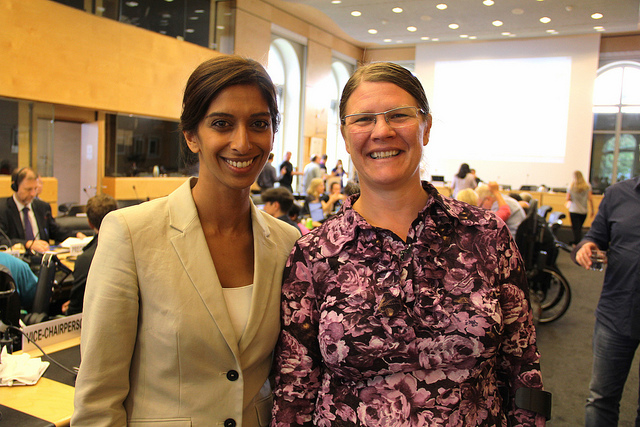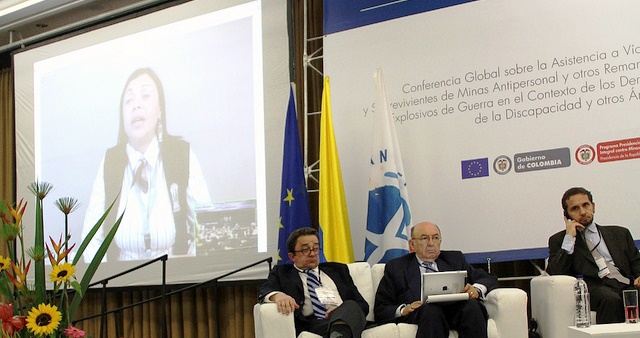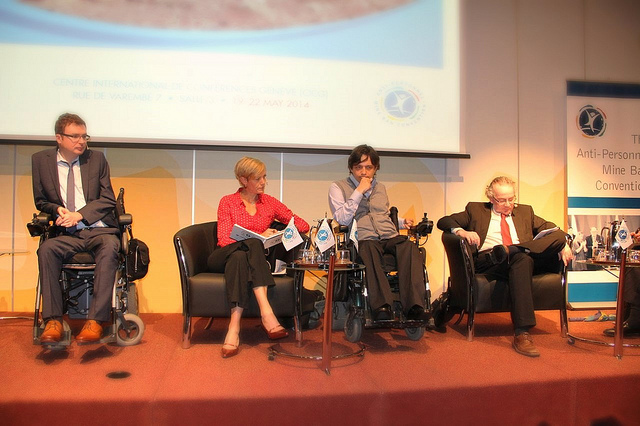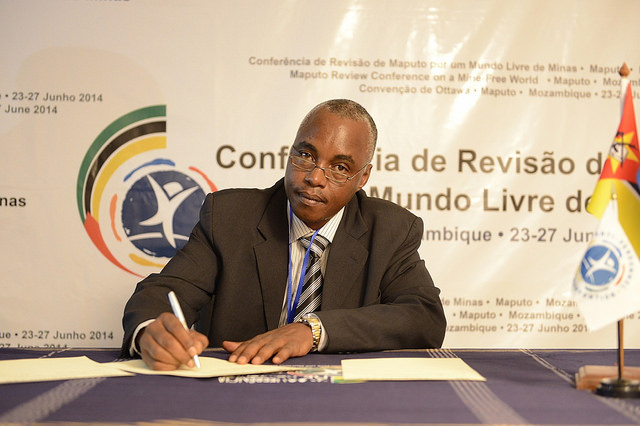|
19.09.2014
Descargue la declaración en inglés | PDF 35KBVea una selección de fotos de la participación de la ISU en el Comité en Flickr
El Comité y sus miembros son cooperantes importantes en el esfuerzo para garantizar que los sobrevivientes de explosiones de minas antipersonal logren participar en todas las esferas de sus sociedades en una base de igualdad con los demás. Paramdeep Mtharu de la ISU con Diane Mulligan, Miembro del Comité.Lea la declaración completa en inglés aquí abajo. 12TH SESSION OF THE UNITED NATIONS COMMITTEE ON THE RIGHTS OF PERSONS WITH DISABILITIES
Cooperation with this Committee is exactly what the Anti-Personnel Mine Ban Convention Implementation Support Unit has strived for in the fulfilment of its mandate. The Implementation Support Unit, in serving the 162 States Parties to the Anti-Personnel Mine Ban Convention, is charged with liaising and coordinating with actors that are relevant to the pursuit of the Convention’s aims. We consider this Committee, its members and other partners such as the United Nations Office for the High Commissioner for Human Rights and the International Disability Alliance to be highly relevant actors when it comes to the implementation of the Anti-Personnel Mine Ban Convention. The Convention, whose States Parties we serve, was the first multilateral arms control or disarmament treaty to make provisions for the victims of a particular weapon system. In doing so, the Convention made a promise that efforts will be made to ensure that landmine victims may become survivors who are able to participate in all spheres of their societies on a basis equal to others. In the fulfilment of their promise to landmine victims and survivors, the States Parties to the Convention have understood that what they call victim assistance “should be integrated into broader national policies, plans and legal frameworks related to the rights of persons with disabilities, health, education, employment, development and poverty reduction.” To act upon this understanding, the States Parties, at their June 2014 Third Review Conference, affirmed that “engagement in other domains” is necessary. That is, what they call landmine victim assistance is not a world unto itself but rather is, or should be, part of other worlds.
With this sentiment in mind, the Implementation Support Unit, with the financial assistance and foresight of the European Union, collaborated with Colombia in staging the 3-4 April 2014 global conference, Bridges between Worlds.Bridges between Worlds was an initiative to address some fundamental questions about the place of landmine victim assistance in domains, such as the worlds of disability, heath care, education, employment, development, poverty reduction and human rights. One the key conclusions made at the Medellin conference was that, while we met to discuss bridges between worlds, in fact, there are not different worlds. There is one world with physical, attitudinal and other barriers preventing the full participation of women, girls, boys and men living with a disability, including landmine survivors, in all spheres of their societies on a basis equal to others. Bridges between Worlds also highlighted that those who care deeply about the fulfilment of the Anti-Personnel Mine Ban Convention’s promise to landmine victims and survivors have much in common with those concerned with the well-being and the rights of women, girls, boys and men injured and living with disabilities regardless of the cause. If it was not already apparent, it was made abundantly clear that there is strength in pursuing this unity of purpose and working together towards the achievement of common goals. Strengthening partnerships would be of benefit to all involved in supporting implementation of the Anti-Personnel Mine Ban Convention and the Convention on the Rights of Persons with Disabilities, particularly if done on a country-by-country basis when a state has agreed to be bound by both instruments. We look forward to exploring avenues for closer collaboration as is spelled out in more detail in the Bridges between Worlds Chairperson’s Summary. We are grateful that members of this Committee contributed their time and expertise to the goal of building and strengthening bridges between worlds.
Committee on the Rights of Persons with Disabilities Chair, Maria Soledad Cisternas Reyes, and Vice-Chairman, Ron McCallum, contributed via video link between Medellin and Geneva in April, and I thank them for their commitment.Bridges between Worlds in Medellin was just the beginning. On 22 May of this year, the Implementation Support Unit, again with the financial assistance of the European Union and thanks to the initiative of Austria and Costa Rica, organized Bridges between Worlds: the Geneva Edition, which featured the views of the International Labour Organization, the United Nations Office of the High Commissioner of Human Rights and the International Disability Alliance. |



 El 15 de septiembre, Paramdeep Mtharu de la Unidad de Apoyo a la Implementación de la Convención (ISU) se dirigió la
El 15 de septiembre, Paramdeep Mtharu de la Unidad de Apoyo a la Implementación de la Convención (ISU) se dirigió la 



